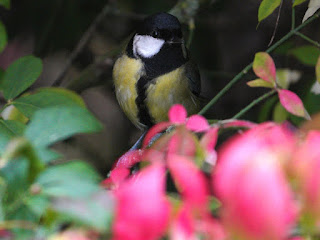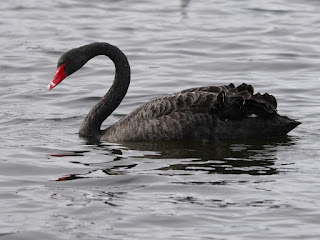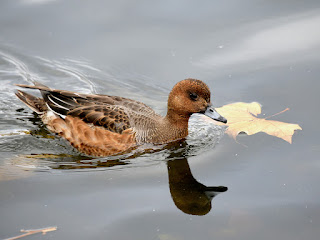A Blackbird ate the fruit of the yew tree on the corner of the Dell. All parts of the yew are poisonous except for the red aril (the juicy outside) of the fruit, but the 'stone' (which is actually a tiny and very hard cone) goes through the bird undigested and doesn't poison it.
The onset of autumn has reduced the number of insects and made the small birds hungry. A Great Tit near the bridge looked out of the red leaves of a euonymus bush near the bridge, expecting a pine nut ...
... and there was another in the holly above.
A Jay waited to be given a peanut.
The male Peregrine was on the barracks tower. There are no shortages for him, as the supply of Feral Pigeons is endless.
A Wren beside the Serpentine photographed by Ahmet Amerikali.
The two youngest Great Crested Grebe chicks on the Long Water are now as large as their parents, but still far from independent.
This year's young carp in the Italian Garden pools have now grown large enough to interest Cormorants.
The male Mute Swan who now permanently lives here posed grandly on the edge of a pool.
The Black Swan is now usually at the far end of the Serpentine, hoping to be given food by the diners on the Dell restaurant terrace.
A Tufted drake dived against a background of autumn leaves in the shallow water in front of Peter Pan.
A pair of Gadwalls fed side by side on the Long Water.
Ahmet found the female Wigeon here -- I had missed her from the Serpentine and not seen her for several days.
There are still Common Carder bees on the plumbago in the Rose Garden.
Tom was at Rainham Marshes and found a handsome Brambling on a hawthorn.













The Anas Penelope bit always gave me a bit of pause. Why would a wigeon be called Penelope's duck? Turns out there is an obscure legend about the name: when Penelope was born her parents cast her into the sea because they wanted a boy, not a girl, but a family of ducks rescued the baby and brought it back to land. The parents thought it as a divine sign and decided to keep and rear her. They changed her name to Penelope to remember the ducks' role in saving her.
ReplyDeleteThank you. What a wonderful legend. The big Liddell & Scott has πηνέλοψ, 'a parti-coloured duck', a creature that both versions of Birds in the Ancient World miss completely, though we hear a lot about Odysseus' wife and her beloved geese.
Delete